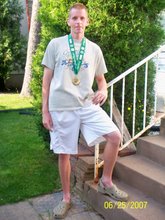Younkers Massage Studio
Where I worked as a certified massage therapist. |
 |
Me with Misty, again.
Me with the pretty puppy! |
 |
Me with the 1987 Toyota Supra
The "Night Rider" car. |
 |
West Supreior Street
The western edge of downtown |
 |
View of downtown from the harbor, winter.
View of downtown on a very chilly day on the lake! |
 |
Aerial Lift Bridge & Lake Superior
View of downtown Duluth and Lake Superior from the hillside. |
 |
Downtown Duluth YWCA
Where I worked for...well...ever! |
 |
Downtown Duluth
View from a boat on Lake Superior |
 |
Downtown
From Skyline Parkway |
 |
Duluth Central High School
One of Duluth's finest landmarks, the old Central High School. The new Central is on top of the hill, on the upper left hand corner. |
 |
Downtown YMCA Duluth
302 W 1st St. I worked here for a long time too...lots of memories here!! |
 |
Kingsley Heights Apartments and Sammy's Pizza
1st Ave W & W 1st St |
 |
Frances Skinner Apartments and the Adult Sauna
1st Ave E & E 1st St - Duluth's Skid Row. This is the worst intersection in the city as far as robberies, stabbings, down-n-out types, prostitution and drug dealing. Anything goes here at night. |
 |
Downtown Duluth YWCA
Another shot of the Downtown Duluth YWCA 1906-2006. |
 |
Duluth Sauna, 18 N 1st Ave E
This is the last gay sauna left in the midwest. This has been a meeting place for gay men for almost 50 years. |
 |
First Bank Place
First Bank Building from the 200 block of West 1st St, Downtown Duluth. |
 |
Medical Arts and Lonsdale Bldgs.
300 block of West Superior St |
 |
Another photo of the Duluth Sauna, 18 N 1st Ave E
While this is called the Duluth Family Sauna, it's been an adult business for many years. The upstairs has private rooms for couples, and the downstairs is a public men's sauna mostly for gay men. It's not as sleazy as you think...it's been a place for gay men in the community to hang out and relax because there are very few other places in Duluth to do so. |
 |


